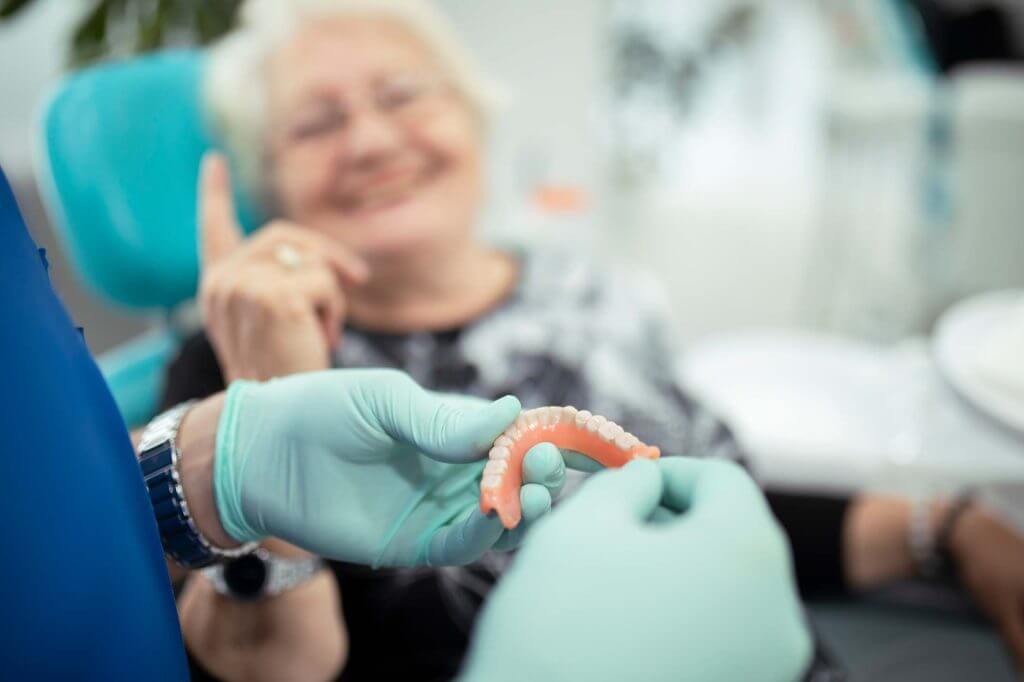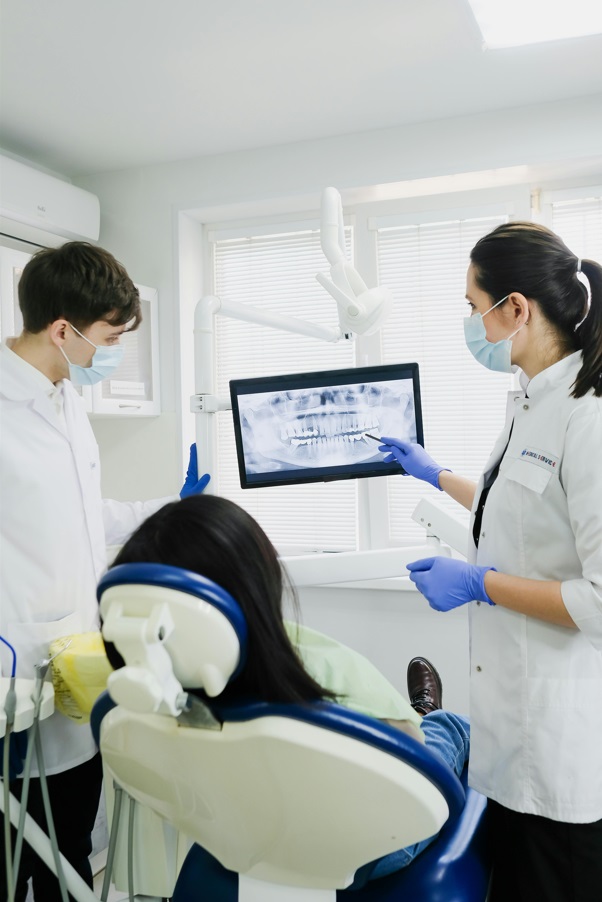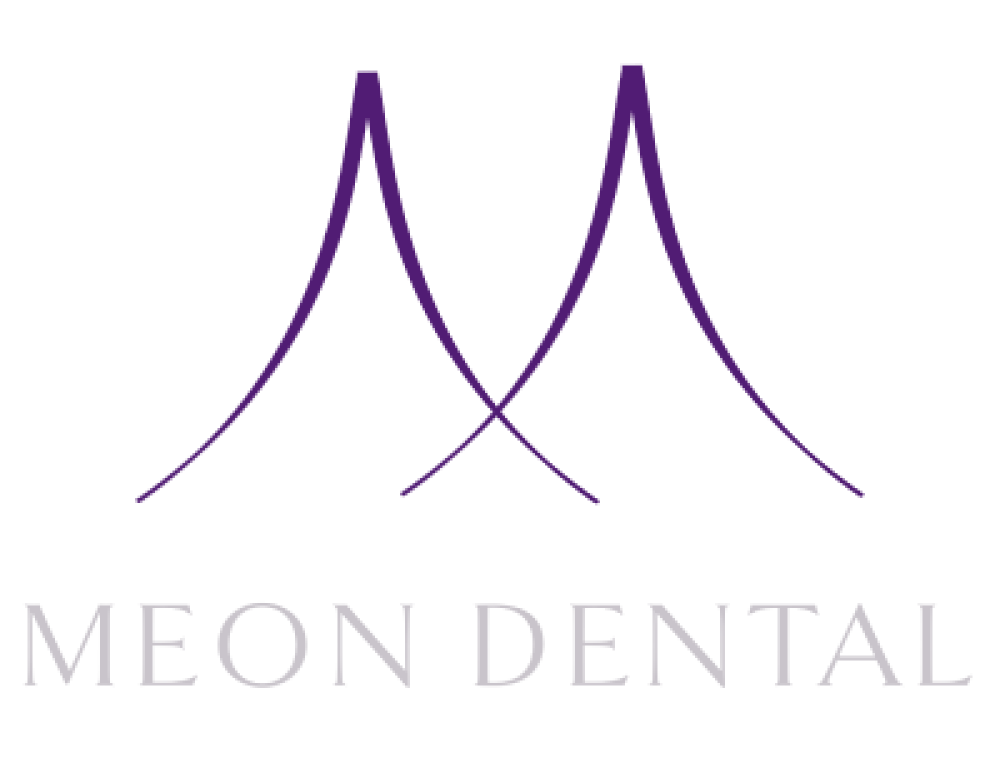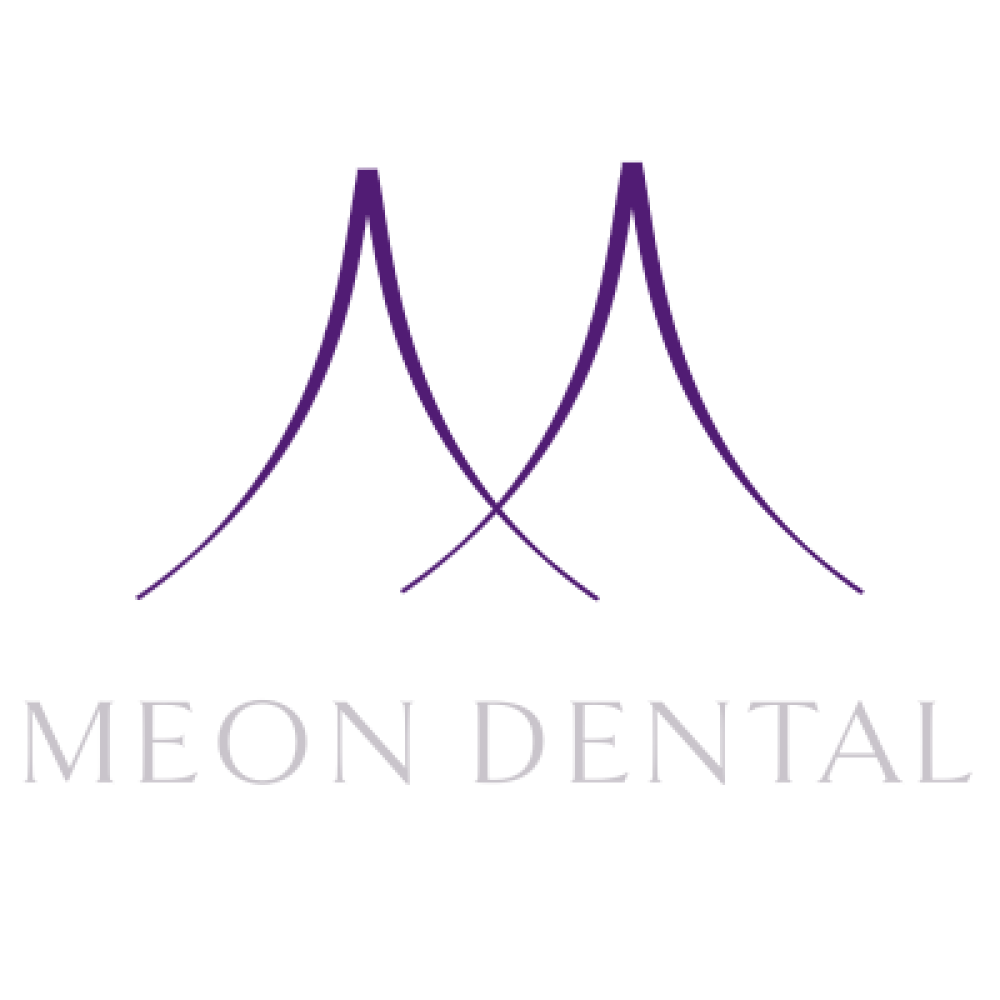DENTURES
Missing teeth causing you to be self-conscious about your smile? Dentures may be the perfect solution! Our dentures at Meon Dental are easily maintained and made from durable, high-tech materials.


Your dentures will act just like your natural teeth.
You may need either partial or complete dentures to improve the appearance of your smile and help to prevent problems with eating and speech. Dentures are not the only tooth-replacement option available, this is were our experienced and professional dental team at Meon Dental can asssit in comparing the best options well suited to you.
Dentures are removable dental appliances that replace missing teeth and restore oral function and aesthetics. They are custom-made to fit the individual’s mouth. They typically have a pink acrylic base resembling the gums and artificial teeth made of porcelain or acrylic resin. Dentures can replace either a few missing teeth (partial dentures) or an entire arch of teeth (complete dentures). They are designed to closely resemble natural teeth and gums, providing support for facial muscles, enabling proper chewing and speech, and restoring the appearance of a natural smile. Dentures are a popular and effective treatment option for individuals who have lost teeth due to decay, gum disease, injury, or other dental issues, helping them regain confidence and improve their quality of life.
The different types of dentures available include:
Complete Dentures: Also known as full dentures, complete dentures replace all teeth in the upper or lower jaw or both. These dentures rest directly on the gums and are typically held in place by suction or dental adhesive.
Partial Dentures: Partial dentures are used when some natural teeth remain in the mouth. They consist of replacement teeth attached to a pink or gum-coloured base, connected to a metal framework or clasps that attach to the remaining natural teeth for support.
Immediate Dentures: Immediate dentures are placed immediately after tooth extraction, allowing the patient to have teeth immediately after extraction while their gums heal. These temporary dentures may require adjustments as the gums shrink and heal.
Implant-Supported Dentures: Implant-supported dentures are secured by dental implants surgically placed into the jawbone. These dentures offer increased stability and support compared to traditional dentures and help prevent bone loss in the jaw.
Overdentures: Overdentures are similar to implant-supported dentures but are supported by dental implants and the remaining natural teeth. This combination provides additional stability and support for the dentures.
Flexible Dentures: Flexible dentures are made of a flexible material such as nylon instead of traditional acrylic or metal. They offer a more comfortable fit and are less likely to break than traditional dentures.
Immediate Load Dentures: Immediate load dentures, also known as same-day dentures or immediate function dentures, are implant-supported dentures placed on the same day as dental implant surgery. They allow patients to leave the dental office with a full set of teeth on the same day as their implant surgery.
Each type of denture has its advantages and considerations, and the most suitable option for you will depend on factors such as the condition of your remaining teeth, the health of your gums and jawbone, and your personal preferences. Your dentist can help determine the best type of denture for your needs.
During your denture appointment, you can expect the following steps:
Consultation and Examination: Your dentist will examine your mouth, gums, and any remaining teeth to assess your oral health and determine your best treatment options. They will discuss your dental history, any concerns or goals you have, and answer any questions you may have about dentures.
Impressions and Measurements: If dentures are recommended, your dentist will take impressions (molds) of your mouth using dental putty or digital scanning technology. These impressions will be used to create custom-fit dentures tailored to your mouth.
Selection of Denture Type and Materials: Based on your needs and preferences, your dentist will help you choose the type of denture that is best for you, such as complete dentures, partial dentures, or implant-supported dentures. They will also discuss the materials used for the dentures, such as acrylic, porcelain, or metal.
Trial Fitting: Once your dentures are fabricated, you will have a trial fitting appointment where you try on the dentures to check the fit, comfort, and appearance. Your dentist may make adjustments to ensure the dentures fit properly and are comfortable to wear.
Final Fitting and Adjustments: After making any necessary adjustments, your final dentures will be fitted and placed in your mouth. Your dentist will ensure that the dentures fit securely and comfortably and provide instructions on caring for and maintaining them.
Education and Care Instructions: Your dentist will provide you with detailed instructions on how to care for your dentures, including how to clean them, remove them, and store them properly. They will also discuss any dietary restrictions or changes necessary with dentures.
Follow-Up Appointments: You may need to schedule follow-up appointments with your dentist to monitor the fit and function of your dentures and make any additional adjustments as needed.
Overall, your denture appointment is a collaborative process between you and your dentist to ensure you receive high-quality dentures that restore your smile, function, and confidence. If you have any questions or concerns during the appointment, communicate them with your dentist for personalised care and support.
Yes, there are a few things you can do to prepare for your denture appointment:
Gather Information: Be prepared to inform your dentist about your dental and medical history, including any medications you are taking and any existing dental issues or concerns.
Make a List of Questions: Take some time to write down any questions or concerns about dentures or the denture process. This will help ensure you get all the information you need during your appointment.
Arrange Transportation: If you are receiving sedation or anaesthesia during your denture appointment, arrange for someone to accompany you to and from the appointment, as you may not be able to drive yourself.
Eat Beforehand: Depending on the type of denture appointment, you may be advised to avoid eating or drinking for a certain period before the procedure. If this is the case, eat a meal or snack beforehand to avoid feeling hungry or lightheaded during the appointment.
Practice Good Oral Hygiene: Brush and floss your teeth thoroughly before your appointment to ensure your mouth is clean and free of plaque and debris. This will help create a clean and healthy environment for your dentist.
Arrive Early: Plan to arrive at your dental office a few minutes early for your appointment to allow time for check-in procedures and to fill out any necessary paperwork.
Bring Necessary Items: Bring any dental insurance information, identification, or payment methods that may be required for your appointment. If you have any dental records or X-rays from previous appointments, please bring those along.
By preparing for your denture appointment, you can help ensure that the process goes smoothly and that you get the most out of your time with your dentist. If you have any specific questions or concerns about preparing for your appointment, discuss them with your dentist beforehand.
Yes, modern dentures are designed to closely resemble natural teeth and gums, providing a natural-looking appearance. Denture materials have advanced significantly in recent years, allowing for more lifelike results that closely mimic natural teeth’ colour, shape, and texture. Dentures are custom-made to fit each individual’s mouth and facial features, ensuring a comfortable fit and a natural appearance. The colour and shape of the artificial teeth can be carefully selected to match the patient’s natural teeth and facial features, resulting in a seamless integration with the rest of the smile.

Aftercare for a Dentures Procedure
Meon Dental prioritises your oral health and well-being even after your Dentures procedure. The essential aftercare is crucial to maintaining good oral health and prolonging the longevity of your Dentures.
We have prepared a comprehensive aftercare guide to assist you. Click here to see the Dentures aftercare guide:

